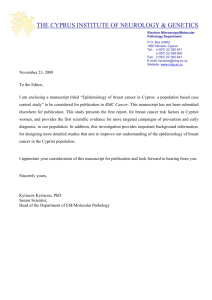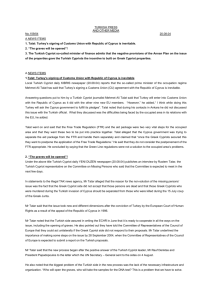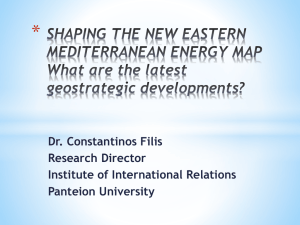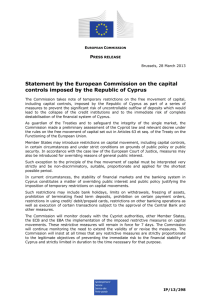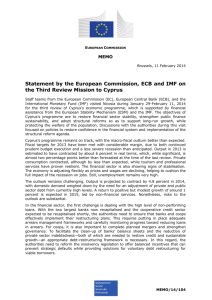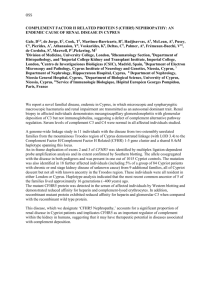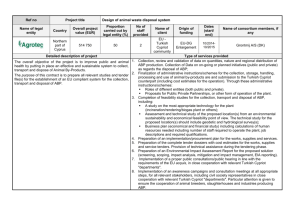Interim Resolution ResDH(2007)25 concerning the judgment of the
advertisement
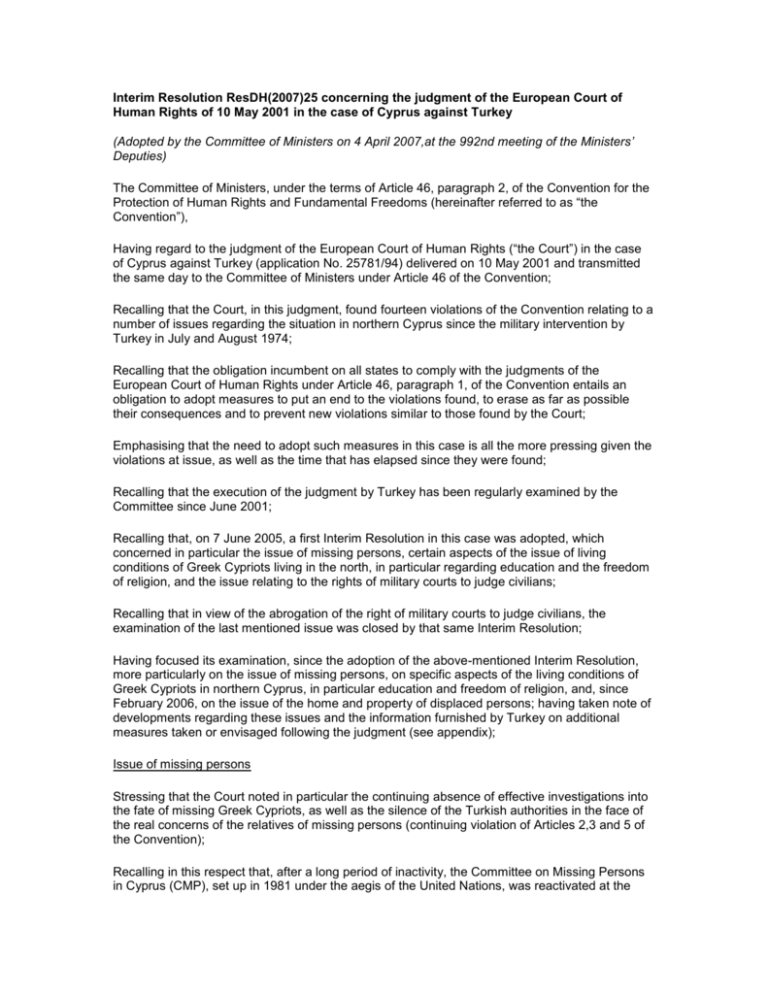
Interim Resolution ResDH(2007)25 concerning the judgment of the European Court of Human Rights of 10 May 2001 in the case of Cyprus against Turkey (Adopted by the Committee of Ministers on 4 April 2007,at the 992nd meeting of the Ministers’ Deputies) The Committee of Ministers, under the terms of Article 46, paragraph 2, of the Convention for the Protection of Human Rights and Fundamental Freedoms (hereinafter referred to as “the Convention”), Having regard to the judgment of the European Court of Human Rights (“the Court”) in the case of Cyprus against Turkey (application No. 25781/94) delivered on 10 May 2001 and transmitted the same day to the Committee of Ministers under Article 46 of the Convention; Recalling that the Court, in this judgment, found fourteen violations of the Convention relating to a number of issues regarding the situation in northern Cyprus since the military intervention by Turkey in July and August 1974; Recalling that the obligation incumbent on all states to comply with the judgments of the European Court of Human Rights under Article 46, paragraph 1, of the Convention entails an obligation to adopt measures to put an end to the violations found, to erase as far as possible their consequences and to prevent new violations similar to those found by the Court; Emphasising that the need to adopt such measures in this case is all the more pressing given the violations at issue, as well as the time that has elapsed since they were found; Recalling that the execution of the judgment by Turkey has been regularly examined by the Committee since June 2001; Recalling that, on 7 June 2005, a first Interim Resolution in this case was adopted, which concerned in particular the issue of missing persons, certain aspects of the issue of living conditions of Greek Cypriots living in the north, in particular regarding education and the freedom of religion, and the issue relating to the rights of military courts to judge civilians; Recalling that in view of the abrogation of the right of military courts to judge civilians, the examination of the last mentioned issue was closed by that same Interim Resolution; Having focused its examination, since the adoption of the above-mentioned Interim Resolution, more particularly on the issue of missing persons, on specific aspects of the living conditions of Greek Cypriots in northern Cyprus, in particular education and freedom of religion, and, since February 2006, on the issue of the home and property of displaced persons; having taken note of developments regarding these issues and the information furnished by Turkey on additional measures taken or envisaged following the judgment (see appendix); Issue of missing persons Stressing that the Court noted in particular the continuing absence of effective investigations into the fate of missing Greek Cypriots, as well as the silence of the Turkish authorities in the face of the real concerns of the relatives of missing persons (continuing violation of Articles 2,3 and 5 of the Convention); Recalling in this respect that, after a long period of inactivity, the Committee on Missing Persons in Cyprus (CMP), set up in 1981 under the aegis of the United Nations, was reactivated at the end of August of 2004 and that a special information unit has been set up for families within the Office of the Turkish Cypriot member of the CMP; Noting with satisfaction in this context that, in the framework of the Exhumation and Identification Programme, launched in August 2006 under the auspices of the CMP, exhumations have been performed all over Cyprus and anthropological analysis of remains found is being conducted in an anthropological laboratory established in the buffer zone, for purposes of identification of those remains; Recalling however once again, that the Court found that “although the CMP’s procedures are undoubtedly useful for the humanitarian purpose for which they were established, they are not of themselves sufficient to meet the standard of an effective investigation required by Article 2 of the Convention, especially in view of the narrow scope of that body’s investigations” (§135 of the judgment) and its territorial jurisdiction, which is limited to the island of Cyprus (§27 of the judgment); Noting that the CMP has the mandate to draw up an exhaustive list of missing persons of both communities, to determine whether they are alive or dead, and, in the latter case, determine the approximate date of their deaths; Welcoming the concrete measures taken in the framework of this mandate, and in particular through the aforementioned Exhumation and Identification Programme, which clearly evidence a positive development in the execution of the present judgment; Recalling however that additional measures are required in order to ensure full compliance with the Court’s judgment as regards the requirements of effective investigations, aimed at clarifying the whereabouts and fate of Greek-Cypriot missing persons who disappeared in life-threatening circumstances or of whom there is an arguable claim that they were in custody when they disappeared, and regretting that, since the adoption of the first Interim Resolution in this case, Turkey has furnished no information in this respect; Emphasising again the urgency of this issue, WELCOMES the progress achieved in the work of the CMP, and in particular through the Exhumation and Identification Programme, and encourages the continuation of the efforts so far deployed; CALLS UPON Turkey, however, to rapidly provide information on additional measures required to ensure the effective investigations called for by the Court’s judgment; Issues relating to education Recalling that the Court found that the schoolbooks destined for use in the primary school of Greek Cypriots living in northern Cyprus were subject to excessive measures of censorship (violation of Article 10) and that the absence of appropriate secondary education facilities constituted a violation of the right to education of Greek Cypriots living in northern Cyprus (violation of Article 2 of Protocol No. 1); Welcoming the continued functioning of the secondary school in Rizokarpaso since 2004 and in particular the fact that since September 2005 full secondary education to Greek Cypriot children is ensured; noting also the improvement of the regulatory framework aimed at securing the basis for the secondary education offered; Noting with satisfaction the undertaking of the Turkish authorities to continue to provide for full secondary education for Greek Cypriot children in the future; Welcoming in this context that censorship of schoolbooks no longer takes place, the censorship procedure having been replaced by a simple and swift screening procedure which takes into account notably the criteria of the European Convention and only results in a report containing recommendations; DECIDES to close the examination of the issues relating to the violations found under Article 2 Protocol 1 and Article 10 of the Convention; Issues relating to the freedom of religion Recalling that the Court considered that restrictions on the freedom of movement of the Greek Cypriot population living in northern Cyprus, as well as the refusal to appoint a second priest in the region of Karpas, had infringed their freedom of religion (violation of Article 9); Welcoming that such restrictions have been lifted in a satisfactory manner and noting in particular that numerous examples demonstrate that a normal and regular religious life in conformity with the requirements of the Convention is today possible; Recalling that a request for the appointment of a second priest formulated by the Cypriot authorities through UNFICYP was approved in March 2005 but that the priest in question did not take up his duties due to personal reasons; recalling also that two further requests have been dealt with speedily, the appointment having however been rejected for reasons of security; Noting that on 29 December 2006, the authorities of the applicant State made a new request for the appointment of a second priest to officiate in the Karpas region through UNFICYP, which has been confirmed by the competent authorities; DECIDES to close the examination of the issues relating to the violations found under Article 9 of the Convention; Issues relating to home and property of displaced persons Recalling that the Court found violations by reason of the refusal to allow the return of any GreekCypriot displaced persons to their homes in northern Cyprus (continuing violation of Article 8), by the fact they were being denied access to and control, use and enjoyment of their property as well as any compensation for the interference with their property rights (continuing violation of Article 1 of Protocol No. 1) and by reason of the absence of a remedy to contest interferences with their rights under Article 8 of the Convention and Article 1 of Protocol No. 1 (violation of Article 13); Taking note of the information submitted by the Turkish authorities on the adoption of the “Law for the Compensation, Exchange and Restitution of Immovable Properties” (“Law no. 67/2005”), which entered into force on 22 December 2005, and on the establishment and functioning of the “Immovable Property Commission”; Noting the assessment of this mechanism made by the Third Chamber of Court in its judgment regarding just satisfaction in the case of Xenides-Arestis of 7 December 2006, but underlining the fact that the judgment in question has not become final yet since the applicant party and the Government of the respondent state made requests for the referral of the case to the Grand Chamber; Reiterating the necessity not to interfere with the current ongoing judicial process before the Court in the Xenides-Arestis case and not to pre-empt or influence in any way the assessment the Court will be called on to make in that context; Recalling further that detailed and concrete information on changes and transfers of property at issue in the judgment and on the measures taken or envisaged regarding this situation has been regularly requested since June 2006 (966th meeting), in particular in the light of the ongoing property developments in northern Cyprus, and noting in this respect that the information provided in response does not yet clarify this issue; URGES the Turkish authorities to provide without delay such information, as well as information on measures taken to safeguard the property rights of the displaced persons as these have been recognised in the judgment of the European Court, without prejudging the redress required by the Convention, be it restitution, compensation, exchange or otherwise. Other outstanding issues Recalling that additional issues remain outstanding regarding further aspects of the living conditions of Greek Cypriots in northern Cyprus, notably those related to their property rights and their right to effective remedies; Taking note of the fact that the Turkish authorities have recently submitted further information regarding these issues which remains to be assessed; ***** Welcomes the progress achieved in the execution of this judgment since the first interim resolution, which now allows the Committee to also close its examination of the violations established in relation to the issues of education and freedom of religion, Requests Turkey to rapidly take all the additional measures required to ensure the full and complete execution of the judgment; Decides to resume the consideration of the outstanding issues at their 997th meeting (5-6 June 2007), and Decides to continue the supervision of progress accomplished until all necessary measures have been taken. *** Appendix to Interim Resolution ResDH(2007)25 Information provided by the Government of Turkey during the examination of the case Cyprus against Turkey by the Committee of Ministers With regard to the issue of missing persons, the reactivated CMP continues to function. In August 2005 an Exhumation and Identification Programme was launched, which has been supported by financial donations from several countries. This Programme entails exhumations on both sides and DNA analysis in an anthropological laboratory established in the buffer zone of remains found, for purposes of identification of those remains. The Turkish authorities invite the Deputies to follow ongoing developments in this context. Concerning the censorship of schoolbooks for use in the Greek Cypriot primary schools in the north of the island, found excessive by the Court with regard to Article 10 of the Convention, the Turkish authorities have declared earlier that the screening of all schoolbooks used in northern Cyprus is presently conducted in conformity with the Council of Europe standards and that it has been relaxed and accelerated. The current simple and swift screening procedure is regulated by a decree adopted by the “TRNC Council of Ministers” on 8 November 2005. With regard to secondary education, the Turkish authorities have announced earlier the opening, on 13 September 2004, of a school in Rizokarpaso providing initially for the first three years of secondary schooling. Since September 2005, this school provides for full secondary education for Greek Cypriot children. The school is now successfully pursuing its activities for the third year. Furthermore, the Resolution adopted by the “Turkish Cypriot Council of Ministers” on 23 May 2005 and amended on 8 November 2005, provides a stable and lasting basis for the continued functioning of the Greek Cypriot school, ensuring full primary and secondary education in line with the requirements of the Convention. With regard to the questions relating to the freedom of religion, the Turkish authorities reaffirm that there is no interference in the religious activities of the Greek Cypriots living in northern Cyprus, since restrictions on the freedom of movement have been lifted. The Turkish authorities furthermore indicate that a new request for the appointment of a second priest to officiate in the Karpas region, introduced by the Cypriot authorities on 29 December 2006 and transmitted by UNFICYP on 27 February 2007, has recently been approved by the “TRNC authorities”. As regards the issue of home and property of displaced persons, the Turkish authorities have provided information on the new “Law for the Compensation, Exchange and Restitution of Immovable Properties” adopted in response to the Court’s judgment in the case of XenidesArestis. In addition, they have made reference to the current economical development in the “TRNC”.


